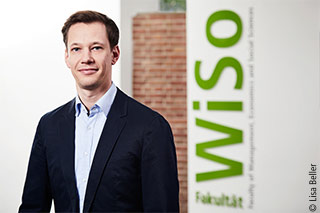Professor Dr Erik Hornung from the Department of Economics at the University of Cologne’s Faculty of Management, Economics and Social Sciences has been awarded the coveted Consolidator Grant by the European Research Council (ERC). The Prestigious research grant was awarded to the project about the stability and decline of elite economic and political power. Hornung will receive up to two million euros in funding over a period of five years. ERC Consolidator Grants are awarded to excellent early-career researchers. In his project ‘ENTRENCHED: Elite Capture and Social Mobility’, which has been selected for funding, Professor Hornung examines the social mobility and influence of elites in times of political upheaval. “Receiving this grant is a great success and I would like to warmly congratulate Professor Hornung on his achievement. This will further strengthen the excellent reputation of the Economics and Social Sciences at our university,” said Professor Dr Joybrato Mukherjee, Rector of the University of Cologne.
There is a remarkable continuity in the composition of the economic elite, even during times of political upheaval. In his proposal, Hornung argues that elites may persist because they often shape the implementation of policies through their influence on public administration and their social ties. Hornung and his team will investigate whether critical social turning points influence the persistence or decline of the elite’s economic and political power. The analyses contribute to current debates on social mobility and the role of elites.
The project examines these issues in the historical context of Prussia, where the landed nobility formed a firmly established elite with enormous power in the 19th century. In the 20th century, they were confronted with significant economic and political upheaval (dispossession in a revolution, two world wars, expulsion from their estates), but they remained very influential.
ENTRENCHED will develop a new micro-dataset from digitized primary and secondary sources, comprehensively documenting the ownership of estates in the 19th and 20th centuries. This data set is supplemented with information on office holders in the public administration as well as archival data on social networks among the elites. Combining these data will allow Hornung to analyse in detail the social mobility and the political influence of the landed nobility, and thus to draw conclusions about the dynamics of the power structures at the time.
One research focus lies on the effects of the abolition of political prerogatives for estate ownership on the social mobility and political influence of the elite. Another area of research is how participation in the two World Wars affected social mobility and the ability of the elite to shape the political process. A third area analyses the role of personal networks for the elite’s social mobility after World War II, especially after their forced relocation to West Germany.
The European Research Council (ERC) is the funding organization of the European Union. Each year, the council selects research proposals from scholars and scientists of all nationalities whose projects are to be carried out in Europe. ERC Consolidator Grants are awarded to researchers seven to twelve years after completion of their doctorate. The research must be conducted in a public or private research institution in an EU Member State or associated country.
Hornung is a member of ECONtribute, the only Cluster of Excellence in economics in Germany and a joint initiative of the Universities of Bonn and Cologne with the participation of the Max Planck Institute for Research on Collective Goods.
